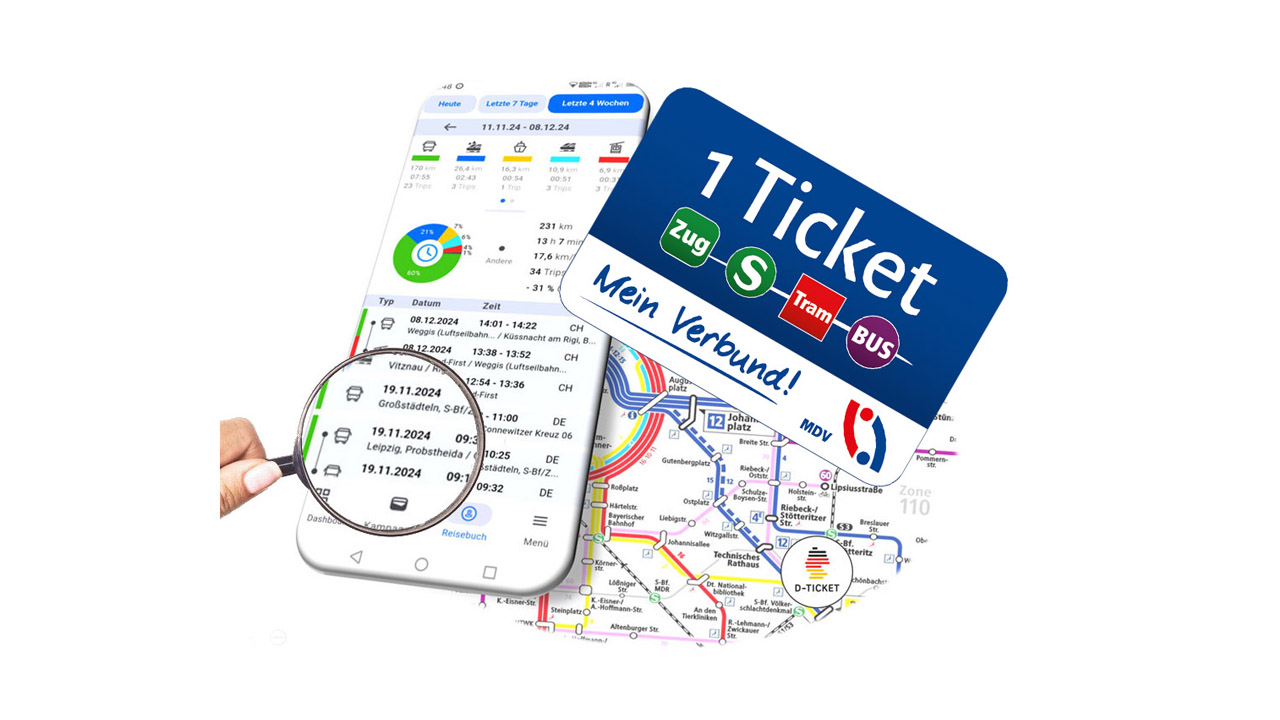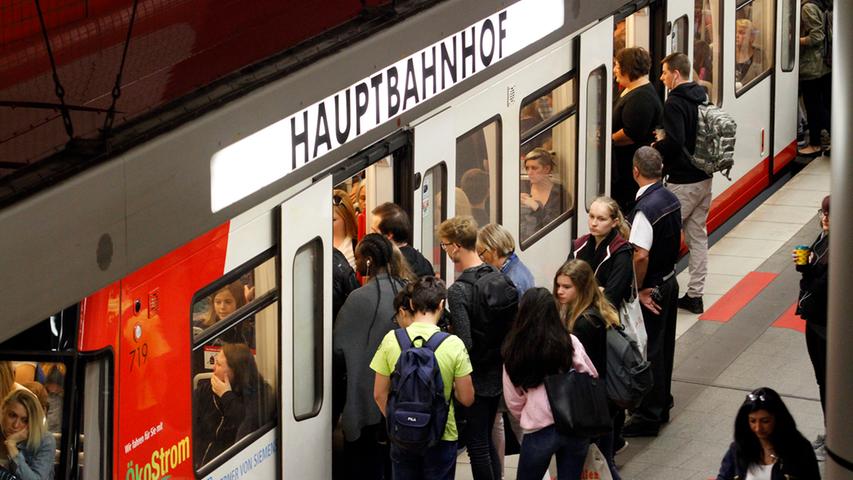WavePointer wins MDV public transport project to collect data for revenue sharing (EAV)
Mitteldeutscher Verkehrsverbund (MDV) checks regional and national recognition of the wagon-sharp passenger route chain with inference to the passenger fare used.
MDV organises sustainable mobility for 2.1 million people in central Germany, whether they live in a large city or in the countryside. The association ensures customer-friendly local public transport and constantly adapts it to the current mobility needs of passengers. The aim is to make the switch to bus and rail even more attractive and to further increase the contribution to the mobility and climate transition. The "1-ticket principle" is also key to this. This means that one ticket is valid for all means of local transport in the selected fare zone: train, S-Bahn, tram and bus.
Together with its network partners, MDV is constantly developing its range of fares in line with the changing needs of passengers. As a result, MDV offers a customised range of tickets for both frequent and occasional travellers. Of course, MDV also offers the Deutschlandticket.
The MDV area covers the three federal states of Saxony, Saxony-Anhalt and Thuringia. It includes the two major cities of Halle (Saale) and Leipzig as well as the districts of Leipzig, North Saxony, the Saale district, the Burgenland district and the Altenburger Land district. Since December 2019, the districts of Wittenberg and Anhalt-Bitterfeld and the city of Dessau-Roßlau have also been part of MDV. In total, this network area covers an area of 11,300 km². Around 2.1 million inhabitants in Saxony, Saxony-Anhalt and Thuringia benefit from the integrated local transport services in the network. The local transport network covers 80 million timetabled kilometres per year. That's five round-the-world journeys a day. With this service and the associated customer-orientation, MDV is a leader in the public transport landscape in Germany.
BMDV promotes the innovative future of public transport
Only twelve out of over 160 applicants were awarded funding for their innovative public transport projects by the Federal Ministry for Digital and Transport (BMDV) in 2024. MDV is one of them. This involves the introduction of solutions that increase the attractiveness of public transport, increase passenger numbers, provide multimodal services or support the introduction and analysis of electronic ticket forms.
The recording of passenger route chains guarantees the performance-based remuneration of transport companies
The successful introduction of the Deutschlandticket has made it clear how simple, flexible, far-reaching and attractive mobility in Germany can be for passengers. With a flat-rate ticket, almost all public transport in Germany can be used. 365 days a year. 24 hours a day. This is a unique offer for people and the environment. This flexible transport service is provided by transport companies and transport associations throughout Germany - every day. The companies provide these services for passengers with flat-rate fares, regardless of where they live. Passengers with a Deutschlandticket can therefore be travelling today in Munich, tomorrow in Hamburg and the day after tomorrow in Berlin and make use of flat-rate travel services. To ensure that the transport companies involved in this process can also be paid proportionately and in line with their performance, systems are needed that enable - in a simple way - the passenger route chain to be recorded for each carriage and the passenger fare to be allocated.


Usage data for the Sales Distribution in public transport
Digital ecosystem for collecting mobility data in public transport
The Swiss company WavePointer provides a solution that digitises and manages all means of public transport, accurately and continuously records passenger route chains and flexibly evaluates mobility data for each vehicle. This is the basis for the development of many future services/solutions in public transport: electronic ticketing (e.g. check-in/check-out), smart customer information systems and, in particular, support for performance-based revenue sharing (PRS).
WavePointer already has extensive experience in the realisation of large and complex public transport projects. Over 500 transport companies around the world are already successfully using WavePointer solutions. The public transport systems of entire nations have also been equipped by WavePointer: This is because WavePointer beacons were installed in all means of transport in Switzerland/Liechtenstein in 2024 as a mandatory industry standard and are now used in regular operations to collect passenger data for the national EAV there, among other things.
Project involving the MDV transport companies, Transdev and Deutsche Bahn
Thanks to this experience, more than 250 buses, 200 suburban trains and 70 regional trains from various transport companies in central Germany have now been equipped with WavePointer Beacons within just over two months - in an uncomplicated, certified retrofitting process. This digitalisation of the infrastructure, which has already been tried and tested hundreds of thousands of times, forms the basis for comprehensive, contactless transport management and the collection of passenger data for each vehicle.
Passengers who primarily travel with a flat-rate ticket (e.g. Germany ticket, monthly ticket, etc.) receive an "eJourney app" or a ticket tag. The eJourney app records all journeys made by each passenger in accordance with strict GDPR guidelines. What is important here is that this process is carried out entirely in the background and without active check-in - using the most modern Be-In/Be-Out technology. Specifically, this means that the passenger has no additional expense. In addition, it is precisely recognized whether and when a passenger is in the public transport environment - because only then is data collected. A survey method can hardly be safer and more targeted these days.
Beacon and geodata are used to automatically record the transport companies, passenger kilometers, travel times, distances, as well as the stops and fare zones a passenger has passed through, and make them available for anonymized data analysis. This data is then used, among other things, to determine the distribution key for the EAV as the basis for the performance-based remuneration of all participating transport companies.
Passengers also receive attractive functions in the app. These include a real-time display of how the passenger is traveling on public transport: lines, courses, stops, routes - all in real time. Passengers also receive a journey log, where all journeys are displayed graphically and in tabular form for each mode of transport and can be tracked in detail by the passenger. A personal CO2 balance is also included, as well as route and timetable displays. An overall evaluation of all passenger data rounds off the comprehensive information offered to the passenger. With this method, the passenger is "right in the middle of things instead of just being there".
Effective information for EAV calculations and CO2 balances
This collected transport and anonymized passenger data is provided to the respective authorized public transport companies via a powerful cloud system (WavePointer eMobilityCloud). A comprehensive multi-client system ensures a targeted flow of information and data protection (GDPR). This means that every participant in the digital public transport ecosystem can only evaluate the data that they are really authorized to: a network, a transport company, the passenger - and possibly also a higher-level, national billing office (clearing). The eCloud offers a comprehensive graphical and tabular evaluation of the data, which is optimally tailored to the industry requirements of transport management and EAV in public transport. There are also many interfaces with existing public transport systems, such as stop standards, fare zones, GTFS data, VM categories, API usage keys, beacon development & roll-out-installation, AFZS, etc.
WavePointer can be used as a regional or national survey basis for the Deutschlandticket (Germany ticket)
"Thanks to our many years of experience and successful international projects, we have enormous practical experience with the effective, uncomplicated and rapid digitization of existing national transport fleets," explains WavePointer. "With its eMobilitySolutions offering for effective EAV data collection, WavePointer already recommends itself as a professional partner for integrated public transport industry solutions when it comes to regional or national data collection for the Deutschlandticket or season ticket passengers. By expanding our product portfolio, we now offer the public transport industry a complete solution that ranges from the beacon infrastructure, which has been tried and tested hundreds of thousands of times, usage data collection via the eJourney app and ticket tag to powerful data analysis in the eMobilityCloud. This creates a data ecosystem that makes it even easier for the public transport industry to offer innovative, efficient and attractive services for passengers. WavePointer is currently expanding these possibilities even further with AI-based Large Language Models (LLMs) that are specifically tailored to the needs of public transport."
About the Mitteldeutscher Verkehrsverbund (MDV)
MDV organizes sustainable mobility for 2.1 million people in central Germany, whether they live in a large city or in the countryside. The association ensures customer-friendly local public transport and constantly adapts it to the current mobility needs of passengers.
The MDV area covers the three federal states of Saxony, Saxony-Anhalt and Thuringia. It includes the two major cities of Halle (Saale) and Leipzig as well as the districts of Leipzig, North Saxony, the Saale district, the Burgenland district and the Altenburger Land district. Since December 2019, the districts of Wittenberg and Anhalt-Bitterfeld and the city of Dessau-Roßlau have also been part of MDV. In total, this network area covers an area of 11,300 km². Around 2.1 million inhabitants in Saxony, Saxony-Anhalt and Thuringia benefit from the integrated local transport services in the network. 80 million timetabled kilometers are covered by local transport in the network area every year. That is five trips around the world per day. With this service and the associated customer orientation, MDV occupies a leading position in the public transport landscape in a Germany-wide comparison.
About WavePointer
WavePointer is an innovative high-tech company headquartered on Lake Zug in Switzerland. The company's team focuses on design and production services in the areas of integrated circuits, electronic systems, firmware, software and proprietary brand development in the Internet of Things (IoT) application area. Customers include international corporations and SMEs in many industries.
WavePointer develops and produces its own, certified product lines and also enables the technical implementation of customer visions. Experienced engineers with awards in the areas of electronics, software and product engineering enable the highest level of performance.
- Design of integrated circuits/electronic systems, including hardware and firmware development
- Global satellite navigation, sensor technology and state-of-the-art radio technology
- Miniaturization, range optimization and ultra-low energy management
- Software engineering with a focus on embedded solutions
- Edge and cloud computing architectures
- Certification of devices, assemblies and housing designs
- Realization of prototypes, small series and mass production
- Automatic identification via a secure QR code system (SQRC) - DENSO Partner
What does performance-based revenue sharing in public transport mean?
Revenue sharing procedures (EAV) regulate how fare revenues from a tariff are distributed among the service providers, i.e. the transport companies that provide the transportation for the passengers. EAVs are increasingly to be implemented in line with performance. This means that revenue distribution must be based on actual passenger demand and usage data. There are various ways of defining fairness of performance, e.g. according to the number of passengers transported (P or LBF, UBF or TBF), according to transport performance (PKM), with or without taking into account the profitability of the ticket used, as well as various structural levels such as fare zones, fare relations or undifferentiated for the entire fare zone.
What are the limitations of the sales data-based revenue split method?
Sales data-supported allocation procedures enable fare revenue to be allocated on the basis of the information already contained in the sales data record, e.g. start zone, destination zone, via zone or route if applicable, ticket type, ticket price and day of validity. In practice, this information is not normally sufficient for demand-oriented allocation to transport companies, so the missing information is filled in using an analytical procedure based on a transport model. Such a procedure determines, for example, all customary connections for each relation (routing procedure) and weights each connection on the basis of an empirically determined daily timetable. For each connection, the transport companies involved are determined and for each transport company the mileage in KM. Taking the above-mentioned aspects into account, a share value per transport company can be determined for each route in this way and used as a distribution key for the revenue from ticket sales for this route.
Distribution methods based on sales data reach their limits when the sales data provide no or too little usable information for a demand-oriented distribution. This can be the case if outdated sales technology is used that does not allow the characteristics to be stored, or in the case of tickets that are issued in advance and whose territorial validity is only determined when they are validated (e.g. number of zones from "stamping station"). By far the biggest problem, however, are tickets with territorial validity, such as flat-rate tickets (Deutschlandticket, D-Ticket, Quer-durchs-Land-Ticket and Ländertickets) or network-wide day tickets. Ticket sales do not provide any information about the routes on which the ticket is used. In these cases, a combination with other methods is required (e.g. automated, demand-oriented usage data collection, traffic surveys, synthetic traffic models, etc.).


